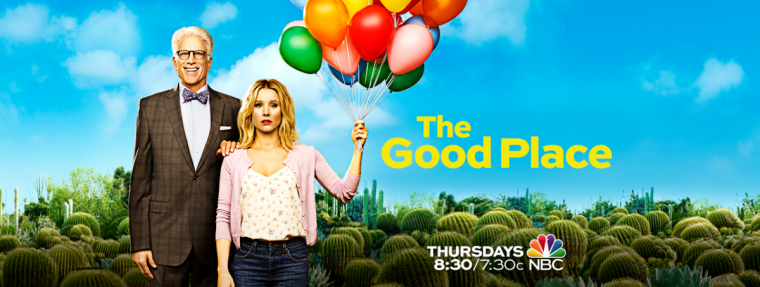Hope, hell and 'The Good Place': the deep spirituality in this afterlife comedy
Are people really interested in the afterlife? A recent hit TV show suggests so. NBC's The Good Place is a profound and provocative comedy all about heaven, hell and what it means to be a good person. It makes a fascinating watch – and asks difficult questions.
Eleanor Shellstrop is dead. But thanks to a life spent protecting the innocent from injustice, she (the brilliant Kristen Bell) has woken up in 'the good place' – the heaven to the hell that is 'the bad place'.
Sound familiar? 'Hindus are a little bit right, Muslims, a little bit right, Jews, Christians, Buddhists...every religion guessed about five per cent', heaven's middle management, known as Michael (the charming Ten Danson), tells Eleanor. It turns out your life is assessed by all the good and bad deeds you did up to the point of your death: the consistent do-gooders go up, those in the proverbial red go down.

The architect of this 'good place', Michael, wants everyone to be happy in their posthumous bliss; he's not God, though there's certainly a fatherly intimacy to his interactions, not unlike the God of Genesis who walks in Eden with Adam and Eve. And just like that primordial pair, everyone in the Good Place is given a 'soulmate', someone they're supposedly perfectly matched with, to live with for eternity.
Except there's a hitch. Shellstrop is not who they think she is – a clerical error obscured the fact that she was both tragically and hilariously selfish in her life. She knows she doesn't belong, and soon all hell breaks loose in heaven. That initial twist of the premiere is one among many surprises across the show, that makes it far more than just a high-jinx sitcom 'set in the afterlife'. Without spoiling what follows, Eleanor embarks on a journey to become a better person, to earn a seat in the good place. With the help of her loveable soulmate and ethics professor Chidi Anagonye (William Jackson Harper), she puzzles over human nature, moral action and eternal judgment. What makes a person 'good', and who gets to say so? Why do we act the way we do – and can we change?
Colleagues in this soul-searching quest include devoted philanthropist Tahani (Jameela Jamil), and Jianyu (Manny Jacinto), a seemingly silent Buddhist monk – there is more to both than meets the eye. The show actively resists importing the theology of one religious worldview, and its creator Mike Schur has made clear that he sees it not as 'religious' in theme, but 'spiritual and ethical'. This broader approach makes the show eminently accessible: this isn't a tortured Christian allegory about how we all need to secure our ticket for salvation before we die. But it's also not a purely secular tale – it is engaging the traditionally 'religious' domain of the afterlife, and as a parable it promotes not hedonistic freedom but the seriousness of our moral choices.
From a Christian perspective, it's fascinating that these questions of eternity and judgment linger in the imagination of popular culture, rather than being dismissed as unsavoury medieval relics. The show reminds us that though we may not think about the afterlife much in the present, moral judgments, particularly about others, remain close to our hearts. And of course, if there's a heaven, we assume we'll be getting in – after all, we're not Hitler. But The Good Place never does what you expect and consistently challenges conceptions of the righteous and unworthy. Like Jesus' radical rebuke to the religious leaders of his day, 'the first shall be last' – if you're sure you're in God's 'good place', you might just be on your way out.
There are elements of CS Lewis' The Great Divorce at work here, and its subversive reflections on human agency and demonic temptation remind one of The Screwtape Letters. There's a hint of Bunyan's Pilgrim's Progress too, and a more than a little owed to The Wizard of Oz.
It isn't 'about' Christianity, but it resonates deeply with Christian thought: it makes a great conversation starter and may prompt difficult questions for contemporary believers. What exactly do Christians think about eternity? Is divine judgment 'fair', or does anyone deserve eternal bliss? Do our choices matter, and is there possibility for redemption even after death? Like any good eschatology (concerning the 'last things'), The Good Place affirms the value of this present life, the depth of human relationships and the redemptive power of love.
You might not think one can engage those questions meaningfully in a colourful comedy such as this. But as The Good Place reminds us, often quite movingly, what you think you know is wrong.
The first two seasons of 'The Good Place' are showing on Netflix now
You can follow @JosephHartropp on Twitter











